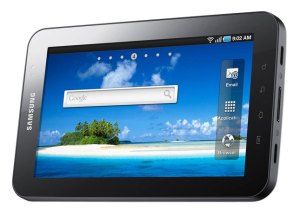
Back in October all eyes were on Samsung’s Android-powered Galaxy Tab as a potential iPad killer, and the company giddily announced it had sold more than 600,000 units in the first few weeks of availability, then over a million units, and now the company says more than two million Galaxy Tabs have gone out the door. However, during the company’s quarter earnings call with investors, a Samsung executive let slip a crucial distinction: those numbers represent the number of Galaxy Tabs Samsung has shipped to wireless operators and retailers around the world, rather than the number of units that have actually been sold to consumers.
During the results call, Samsung’s Lee Young-hee distinguished between sell-out—the number of units a manufacturers sells to retail partners—and sell-in—the number of units actually sold to consumers. In evaluating the market potential of a product, sell-out is an interesting number: it indicates how much interest retailers have in selling the product to consumers. However, actual sales to consumers are critical in evaluating the market success of a device. A manufacturer can ship 10 million items to suppliers, but if 9.9 million of those are returned, remainders, landfilled, or destroyed, the product can hardly be described as a success.
Several technology companies have repeatedly been guilty of blurring the distinction between the two figures; a recent example is Microsoft, which recently trumpeted it had sold 2 million Windows Phone 7 devices, only to have to have those numbers undercut by partners saying sales haven’t met expectations.
Samsung characterized retail sales of the Galaxy Pad as “quite OK,” although the company admits sales to consumers haven’t been “as fast as we expected.” The company has not offered any numbers for how many Galaxy Tab units have been sold to consumers.
Numerous technology companies decline to report numbers of products sold to consumers. A leading example is Amazon, which has never been specific about Kindle sales, only recently saying “millions” of the devices have been sold.


